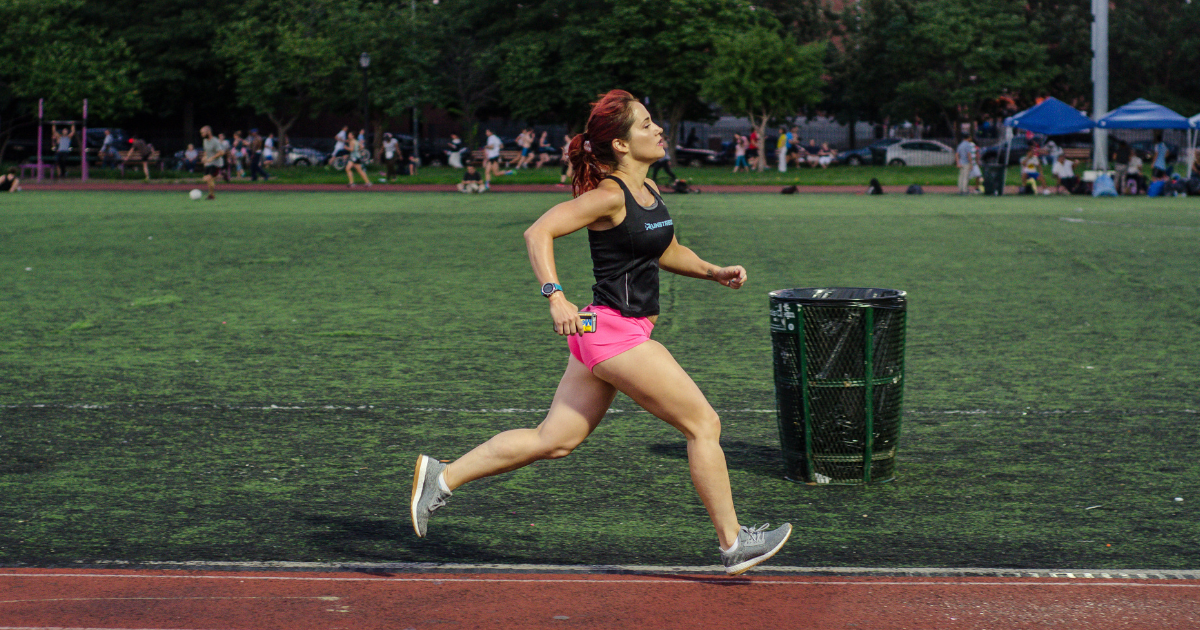How Long Is a Half Marathon? All Your Questions Answered
Photos by Marques Jackson Photography.
By Marnie Kunz, NASM-certified trainer, USATF- RRCA-certified run coach
If you’re wondering how long is a half marathon, it’s 13.1 miles or 21 kilometers. A half marathon is literally half the distance of a marathon. This post will go over all the basics of what you need to know about a half marathon and how to train for one. If you’re considering running a half marathon, I’m also offering my training tips as a running coach. And if you need a training program, check out our half marathon training plans in the Runstreet Training Center.
Related Post: Free Half Marathon Training Plan for Beginners
As a runner and trainer, I’ve trained many people for half marathons as well as run quite a few myself - including in Riviera Nayarit, Mexico, Paris, and NYC. The half marathon is one of my favorite race distances because it requires a good amount of training and planning, but it doesn’t take as much training and recovery time as a marathon. In my opinion, the half marathon is one of the best travel race distances as it’s less stressful on the body than a marathon while still being challenging.
How Long Is a Half Marathon? Distance Breakdown
So how long is a half marathon? A half marathon distance is 13.1 miles or 21 kilometers. A half marathon is half of a full marathon race, which is 26.2 miles. A half marathon is just a little over the distance of two 10K races.
Half marathons are one of the most popular race distances because all levels of runners can train for and complete a half harathon. Also, the half marathon training schedule is less demanding than marathon training, making it more accessible for busy people. There are many half marathon events around the world to choose from, ranging from races like the NYC Half Marathon to trail half marathons.
If you’ve run a 5K or 10K race and are ready for a bigger challenge, half-marathon races offer a great goal. You can train for a half marathon in 2 to 4 months, depending on your current fitness level. If you’ve been running regularly and have run up to 6 miles recently, you may be able to train for a half marathon in 2 months. For beginners, if you’re starting with a few miles a day, it will take 3 to 4 months to train for a half marathon.
For intermediate runners, you may be able to train for a half marathon in 2 to 3 months. If you've set a pace goal, following a half marathon training program with speed training will help you get faster and lower your finish times.
How Long Does It Take to Run a Half Marathon?
After the Riviera Nayarit Half Marathon in Mexico.
In general, most runners take around two hours to run a half marathon. Average half-marathon times usually fall within the 2-hour mark or slightly less. According to Running Level, the average finish time for a half marathon for all ages is 01:50:15.
In general, male runners have a slightly faster half maraton finish time than female runners, and adults in their 30s tend to get the fastest times overall. The women’s half marathon world record was set by Letesenbet Gidey at the Valencia Half Marathon in 2021. The men’s half marathon record holder is Jacob Kiplimo, which he set at the Lisbon Half Marathon in 2021.
While it’s helpful to know the average time for half marathon runners, remember that you are competing against yourself and try to focus on your own progress and not those around you. Also, fitness level plays a central role, and new runners tend to have slower times than advanced runners who have had many racers to practice and years of training.
Benefits of Running a Half Marathon
There are many benefits of running a half marathon, from giving you a boost of motivation and building your confidence to improving your health. Here are some of the benefits of training for and running a half marathon:
More motivation. Training for a half marathon gives you a clear running goal and will boost your motivation. Whether you’re running with a time goal or to complete your first half marathon, having a race to train for will keep you going even during tough workouts.
Better heart health. Running and training for a half marathon will give you lots of cardiovascular strengthening activity. Research shows that running strengthens your heart, can reduce blood pressure, and can keep your cholesterol in check.
Reduced risk of injury. Longer, more demanding races like the marathon are more likely to cause injuries or overtraining. According to researchers, half marathon runners have less muscle fiber damage, lose less water and electrolytes, and experience less muscle fatigue. Overall, you can train for a half marathon with less wear and tear on your body and return to running more quickly after the race than if you ran a marathon.
Improved mental health. Running boosts your mental health. When you run, it increases blood circulation to your brain, which helps improve your mood and combat stress. Regular running even sparks the growth of new blood vessels to nourish your brain and running has an antidepressant effect, according to Johns Hopkins Medicine.
More confidence. Training for a challenging race such as a half marathon also gives you a confidence boost. Following a training plan and getting in the workouts you need to do to make it to the race finish line will give you a big sense of accomplishment.
Half Marathon Training Tips
Now that you know how long is a half marathon, you may be ready to sign up for one and start training. Here are some tips to help you get started:
Pick a race goal.
In general, you’ll need a minimum of 2 months to train if you’re already running regularly or 3 to 4 months if you’re a beginner. Choose a good half marathon with enough time for you to train well for it. If you're a more experienced runner and want to get your best half marathon finish time, you'll need to do speed workouts as part of your training.
Check out The Best Half Marathon Workouts to Get Faster for speed workouts you can add to your training schedule.
Build your mileage slowly.
Increase your weekly mileage gradually. This includes adding miles to your long runs gradually. Follow the principle of progressive overload and increase your running distance no more than 10 percent from week to week.
Follow a training plan.
A training plan will keep you on track to hit your running peak on race day without overtraining. If you need a customized training plan designed by a run coach, check out our Runstreet Training Center.
Do weekly long runs.
The long run is your bread and butter when half marathon training. This is the most important run you’ll do to build your endurance and prepare for race day. A good half marathon training program will include long runs that build your distance gradually to minimize your risk of injury while increasing your stamina.
Sometimes runners struggle with motivation during long runs. For a boost of support, join a running group or have a friend meet you to run the final miles of your long run with you. You can also make a killer running playlist to help you power through all the miles.
Take fuel on long runs and during the race.
Your long runs are a good time to practice your fueling strategy. Take some running fuel - which can be energy gels or chews or real food such as a banana with peanut butter or a Honey Stinger waffle - during your long runs that last over an hour. It may take some experimenting to find the running fuel that works best for your.
Once you find a fuel that works well for you, use it during your half marathon to prevent your body from running out of energy stores. You’ll also need to have hydration during your long runs and in the race so practice this in training by carrying a running water bottle and stopping for regular drinks.
Do speed workouts.
If you want to achieve a specific time, you’ll need to add speed training to your program. For advanced runners, speed workouts are a great way to help you get faster. Tempo runs are a form of speed workout that involves steady-state effort level at a challenging pace that you could maintain for up to an hour.
Intervals like Yasso 800s include bursts of fast running followed by slow, recovery segments. A good half marathon training plan for intermediate runners will include a mix of speed workouts to help you get faster.
Strength train regularly.
Do strength training workouts twice a week (which is also the amount recommended by the Physical Activity Guidelines for Americans). Strength training will help you become stronger, prevent your risk of injuries, and become a faster runner. Regular strength training will also help you achieve a good half-marathon time.
You can start with bodyweight workouts and if you want to add intensity, progress to using dumbbells. Compound exercises like squats, push-ups, planks, and lunges are excellent ways to build your strength efficiently.
Eat enough nutrients.
Nutrition is crucial to perform your best. I have coached too many runners (especially female runners) who are not eating enough to fuel their workouts. Opt for real, minimally processed foods as much as possible so you have the energy you need to run long distances. Carbs, lean protein, and health fats are all essential nutrients that can help you stay strong and reduce your risk of injuries such as stress fractures.
Taper before the race.
Tapering means to reducing your running in preparation for a race. This should be an integral part of your training plan. By decreasing your mileage in the two weeks before your race, you’ll prepare your body to peak at the right time - on race day.
Enjoy the experience!
Running is a gift that not everyone is able to do. Be grateful for the run and enjoy your half marathon! Every race you run creates memories that will last a lifetime.
Take time to recover.
After your half marathon, it’s important to take enough time to recover. A good general guideline is to take a recovery day for half your race distance - which means 6 or 7 recovery days for a half marathon. During this time you can do some active recovery activities like stretching, walking, and low-impact cardio.
Cross train.
Cross training gives your body a break from running while helping maintain your cardivascular fitness level. Add a day of cross training to your weekly workout schedule for active recovery from running. This also gives you a mental break from running.
Some of my favorite cross training exercises for runners are low-impact workouts that allow your legs a break from pounding the ground. Walking, cycling, swimming, yoga, and pilates are all excellent cross training exercises.
Are you training for a half marathon? Get a professional training plan from me, your certified running coach and cheerleader! I have half marathon training plans for beginners and advanced half marathon training plans as well as premium customized training programs available.
Follow and tag @Runstreet on Instagram to share your workouts and get cheered on. Happy running to you!
Related Posts: How to Train for a Half Marathon, 15 Best Half Marathons in the World
Marnie Kunz is a NASM-certified personal trainer and USATF- and RRCA-certified running coach based in Brooklyn, NY. Marnie likes helping people get and stay active to enjoy a better quality of life. When she’s not doing fitness things, Marnie enjoys exploring with her dog, a mischievous rescue Akita.






